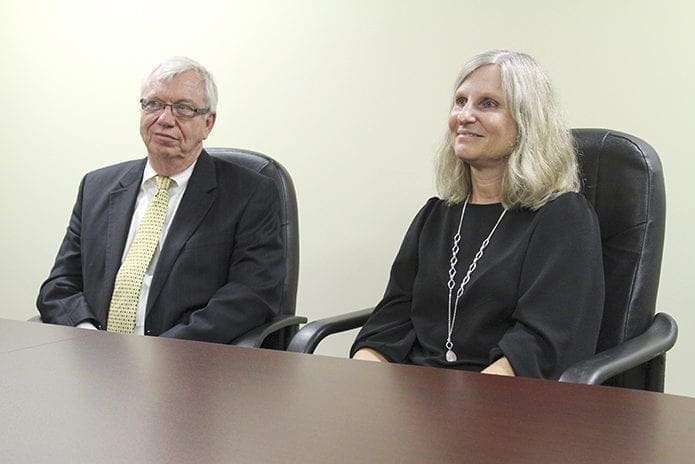 Photo By Michael Alexander
Photo By Michael AlexanderSmyrna
David Brown retires as executive director of GRACE Scholars
By ANDREW NELSON, Staff Writer | Published July 13, 2018
SMYRNA—When David Brown took over as executive director of GRACE Scholars in 2011, some 240 students were attending Catholic schools in Georgia with the help of the state tax credit program.
Now, as Brown retired July 1, more than 1,000 students pursue a Catholic education through the scholarship program.
“It is clear it really did make a difference,” said David Brown, of the nearly decade-old Georgia tax credit program.
As Brown steps away, the new leader in the office does not have a steep learning curve.
Melissa Bassett, 57, recently named as the director of the program, has worked in the GRACE Scholars office for three years. She attends Transfiguration Church, Marietta. Her two grown children attended Catholic grade school and high school. Before raising her family she worked as an accountant.
The chance to work numbers again and help families pursue a Catholic education for their children drew her to the position, she said.
GRACE scholarships assist more than 1,000 in Georgia
Between 2014 and 2017, GRACE awarded $11.4 million tax credit scholarships to eligible students at Catholic schools across Georgia. That amount doesn’t include scholarships from donors who open their wallets and give larger contributions than their approved tax credits.
Some 1,100 students in the Archdiocese of Atlanta and the Diocese of Savannah currently receive scholarships from GRACE. That’s about equal to the number of total students attending St. Pius X High School, Atlanta.
Brown predicts the scholarship money will increase next year, as the maximum state tax credits set aside for the program has nearly doubled to $100 million for the next decade. After that, it drops to $58 million.
Brown said he’s pleased that during his tenure the office became a “well-running machine,” delivering information to schools and parents quickly. The program is very lean. Administrative costs make up only 5 percent of the donations, greater efficiency than required by state law, he said.
And a core of donors have reliably supported the mission of GRACE, including giving beyond what they earn in tax benefits, Brown said.
The next task is to focus on marketing to enlarge the pool of donors, especially small business owners, and working with principals to tap into school communities as possible donors, he said.
Brown, 67, took over the position after a working in higher education scholarship programs. He worked at Georgia State University prior to joining GRACE Scholars. He attends St. Michael the Archangel Church, Woodstock.
Before he started, the position was led by two volunteers. Brown was the first paid leader. He said much of time GRACE works on administrative functions to collect information and write checks to the schools. It isn’t high profile work, but necessary, he said.
Speaking at his retirement party held at the archdiocesan Chancery, Brown said he saw the position in light of the charge of St. Therese of Lisieux to “do small things in great love.”
The administrative work for the program is handled by a small office, he said. It is valuable work in the way it gives a financial boost to families and students attending the Catholic schools, he said.
Program makes Catholic education possible for lower-income families
GRACE Scholars was born out of state policy to broaden school choice for families.
In 2008, Georgia lawmakers passed House Bill 1133 and then Gov. Sonny Perdue signed it into law. The measure allowed student scholarship organizations (SSOs) to use Georgia income tax credit-eligible contributions for scholarships to private school students. All students receiving GRACE awards have demonstrated financial need.
A taxpayer donating to GRACE Scholars receives income tax credit against their Georgia income taxes for their contribution. A married couple filing taxes jointly can contribute up to $2,500 a year. Certain small business owners can contribute up to $10,000 for business income taxes.
The demand for the program has in recent years been greater than the available tax credits. In 2018, lawmakers revised the total available tax credits to $100 million, nearly doubling the amount.
In 2010, some 2,448 donations were made to GRACE. By 2018, donations increased 20 percent.
Brown expects the dollar amount to increase in 2019 when the new law goes into effect.
The median income of families benefiting from the program is $40,553.
The GRACE inbox receives thank you notes from students and parents for the extra help. “It is clear it did make a different because the financial background of the family would make it impossible or almost impossible to attend Catholic schools without some kind of assistance,” said Brown.
At the going-away gathering for Brown, Archbishop Wilton D. Gregory said the work done by Brown and GRACE Scholars helped families who thought it was out of reach to pursue a Catholic education.
Brown’s work ethic shows how he’s a “good example of Christian stewardship” with collecting the resources from donors and putting the money to good use, he said.
“You are always welcome back here. Thank you for making GRACE so successful,” he said.
Said Brad Wilson, the CFO of the Atlanta Archdiocese, “These are kids who would not otherwise be going to our schools.”
The focus of Catholic school administrators is to make the education both affordable and accessible to the community—and GRACE allows that to happen, he said.
Schools superintendent Diane Starkovich, Ph.D., said Brown’s office always had an open door to meet with principals and anyone interested in learning about the program.
“GRACE has made it possible for many families to send their children to a Catholic school in either the Diocese of Savannah or the Archdiocese of Atlanta. Without these scholarships, many families simply could not afford a Catholic education for their children. Dreams have come true and David has been invaluable in making these dreams a reality,” she said.